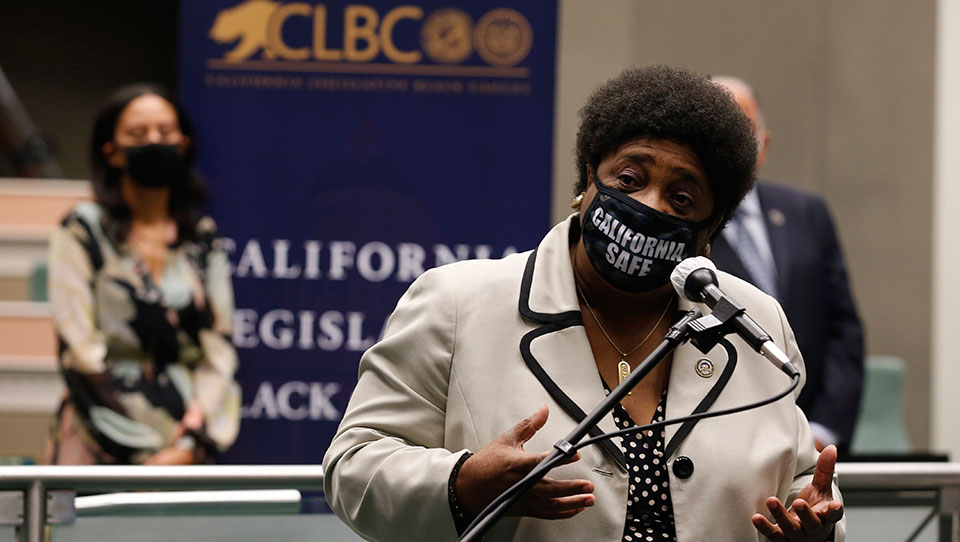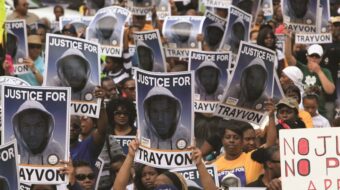
As waves of protest continued to surge throughout the U.S. following the murder of George Floyd by Minneapolis police, the California Legislative Black Caucus last week unfurled a far-reaching legislative agenda to advance racial and economic justice in the state.
As she opened a press conference in Sacramento on June 2, caucus chair Assemblymember Shirley Weber, D-San Diego, told reporters, “We are here because for 400 years African American men and women in this country have been disrespected, because this country has taught itself to hate African Americans and to deny the history that has brought us here. The death of George Floyd is a brutal illustration that we have not come to terms with that.”
“While we fight for the solution,” she said, “we know the solution lies in the changing of this nation and for those who don’t look like us to, for once, take the banner up and fight the battle that is so essential. We have fought it. We have given our lives, given all that we have, and at the same time we still find ourselves the last ones in the door.”
Weber expressed appreciation to the other legislative caucuses supporting the Black Caucus’ platform, including the Women’s, LGBT, Asian Pacific Islander, Latino, and Progressive Caucuses, who “help us carry some of the load that we have to carry each and every day.”
As he recalled the Black Caucus’ recent legislative achievements, Assemblymember Reggie Jones-Sawyer, D-Los Angeles, said the body’s agenda builds on a century-long commitment to advancing the cause of people of color since the first African American entered the California legislature in 1918.
Among recent achievements, Jones-Sawyer highlighted Assembly Bill 392, Peace Officers Use of Force, introduced by Dr. Weber and Assemblymember Kevin McCarty, D-Sacramento, which became effective Jan. 1. The law, one of the strongest such measures in the nation, says police can use lethal force only when “necessary” to defend human life, and actions by both victim and police will be considered when a lethal action is evaluated, including police efforts to de-escalate a situation.
The Legislative Black Caucus’ three top priorities for 2020 legislation include two more measures introduced by Weber.
Assembly Constitutional Amendment (ACA) 5, the California Act for Economic Prosperity, would repeal Proposition 209, a ballot initiative passed by voters in 1996 that banned use of affirmative action in evaluating applications to state institutions of higher education or for government jobs.
AB 3121, Reparations Task Force, would establish an eight-member task force to study and develop proposals for reparations to African Americans in California, prepare a detailed examination of the broad impacts of slavery in the state, and provide guidance for state institutions as they address the resulting disparities.
A third priority measure, McCarty’s ACA 6, “Free the Vote,” would restore voting rights to people serving a parole sentence, eliminating what its author called “a relic of Jim Crow laws.”
Both ACA 5 and ACA 6, if passed by the legislature, would then be placed on the ballot for voters to decide.
Among other measures for which the Legislative Black Caucus is urging support:
- Senate Bill 144, the Families over Fees Act, by caucus member state Sen. Holly Mitchell, D-Los Angeles, to end assessment and collection of administrative fees imposed against people in the criminal justice system;
- AB 1460 by Dr. Weber, to require the California State University system to have an ethnic studies graduation requirement;
- AB 1950 by caucus member Assm. Sydney Kamlager, D-Los Angeles, to limit probation to one year for misdemeanors and two years for felony offenses;
- AB 2405 by Assm. Autumn Burke, D-South Bay, to establish a right to housing for children and families effective Jan. 1, 2026.
Caucus Vice Chair Steven Bradford, D-Gardena, issued a challenge to “all non-African Americans,” telling them, “It’s not enough to say you’re no longer a racist. It’s time to prove it, to challenge your family, friends, colleagues in stopping their racist behavior because then and only then will we have true reform.”
On June 5, California Governor Gavin Newsom pledged his support for new policing reforms, declaring, “We will not sit back passively as a state.” Saying he is “proud that California has advanced a new conversation about broader criminal justice reform,” he emphasized that an “extraordinary” amount of work is needed to achieve cultural change and a “deeper understanding of what it is that we’re working to advance.”
Newsom called for creation of new standards for crowd control and use of force in protests, and committed himself to work with the Legislative Black and Latino Caucuses and other legislative leaders and to consult with community leaders, national experts, law enforcement, and journalists to develop those standards.
The governor also called for an end to use of the carotid hold—the maneuver used when police murdered George Floyd—directing that it be removed from state police programs and training materials. He pledged to work with the legislature on a ban that would apply to all police forces in California.
Besides reforming police practices, Newsom said, urgent action is needed on issues including educational equity, economic justice, and health equity.












Comments